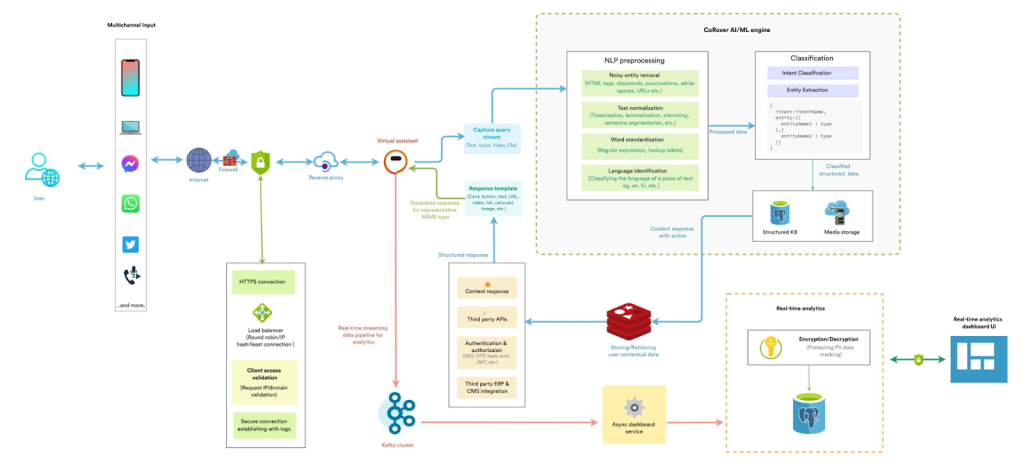AI chatbots in healthcare are emerging as game-changers for hospitals and clinics worldwide, helping alleviate overloaded staff and enhance patient engagement. In an era where healthcare systems face rising patient demand and staffing shortages, these intelligent virtual assistants offer a much-needed solution. By automating routine tasks and providing instant support, healthcare chatbots enable medical professionals to focus on critical care while patients receive timely, personalized assistance.
This article explores how AI-powered chatbots, from simple appointment-booking bots to advanced real-time patient support agents, are transforming healthcare delivery, reducing staff burden and elevating the patient experience.
The Healthcare Challenge: Staffing, Costs and Patient Expectations
Global healthcare spending continues to climb (reaching $4.5 trillion in the US for 2022 alone), and with it comes pressure on providers to deliver accessible, cost-effective care. Hospitals grapple with administrative overload – endless phone calls for appointments, repetitive patient queries, and mountains of data entry. Front-desk staff often spend significant time handling calls about scheduling and routine questions, stretching resources thin. At the same time, patients expect quicker service and 24/7 access to information in today’s digital world. These challenges are fueling a search for healthcare automation solutions that can streamline operations without compromising care quality.

Infographic showcasing key staffing challenges in healthcare: workforce shortages, open roles, and the impact on CEO strategies and business performance (Source: AKASA)
AI chatbots in healthcare have stepped in to address these pain points. They act as tireless digital assistants that can handle many front-line tasks traditionally done by staff instantly and accurately. By automating such routine interactions, healthcare providers free up human staff to focus on more complex, high-value activities like direct patient care or urgent cases. In fact, major U.S. hospitals report up to a 40% boost in operational efficiency after implementing AI chatbots, alongside a reduction in average handling time for inquiries by about 20%. These efficiency gains not only save costs but also help clinicians avoid burnout by offloading repetitive tasks.
Key Applications of AI Chatbots in Healthcare
1. Automating Routine Tasks to Reduce Staff Burden
One of the biggest impacts of AI chatbots has been in healthcare automation – streamlining the countless routine tasks that consume staff time. Consider appointment scheduling: Instead of a receptionist fielding calls, an AI chatbot can allow patients to book appointments via chat or voice interface anytime.

Detailed AI chatbot architecture diagram illustrates processing layers and backend integrations (APIs, databases) typical in intelligent healthcare virtual assistants (Source: Homillux)
These systems check doctor availability, book slots, reschedule if needed, and even send out reminder notifications. Administrative tasks consume a huge portion of healthcare resources. AI chatbots in healthcare streamline them by automating:
- Appointment scheduling & reminders – instant booking, rescheduling, confirmations, and automated notifications.
- FAQs & insurance queries – answers about hours, coverage, or test prep.
- Prescription requests – automated refill requests and routing.
- EHR integration – secure APIs to update or retrieve patient records, avoiding duplicate entry.
AI-driven automation in healthcare can significantly reduce the mundane workload on human staff. Widespread use of healthcare chatbots is expected to save the industry billions annually in operational costs.
- 20–30% reduction in no-shows.
- Up to 40% efficiency gains in front-desk operations.
- Significant decrease in manual errors and staff burnout.
2. Enhancing Patient Engagement and Experience
While chatbots lighten the load for providers, they simultaneously enhance patient engagement by making healthcare more interactive and patient-centered.

Infographic showing how AI chatbots enhance patient engagement: easy appointment booking, instant responses, patient data collection, personalized care and feedback gathering (Source: MultiQoS)
In traditional settings, patients might wait days for a returned call or feel hesitant to ask a busy nurse a “small” question. AI chatbots, on the other hand, are available 24/7 and respond instantly. AI chatbots improve patient engagement by creating a more accessible, supportive care journey:
- 24/7 availability – support outside clinic hours.
- Personalized advice – tailored to patient history or ongoing treatment.
- Safe, judgment-free environment – patients feel comfortable asking sensitive questions.
- Proactive follow-ups – reminders, daily check-ins, treatment adherence monitoring.
Crucially, patient engagement driven by chatbots isn’t just about convenience, it leads to better outcomes. Engaged patients are more likely to follow through on care plans, and chatbots can actively coach and remind them along the way.
By sending personalized tips, answering questions, and providing encouragement, chatbots act like personal health coaches that keep patients on track.
3. Real-Time Patient Support and Proactive Care
Beyond handling simple tasks, modern healthcare chatbots are increasingly capable of providing real-time patient support and even proactive health monitoring. A prime example is symptom triage.

Architecture diagram showing remote patient monitoring system: sensors, health gateways, servers, and clinician dashboards (Source: Slideteam)
AI chatbots can converse with a patient who is feeling unwell, ask a series of symptom-related questions, and instantly analyze against medical knowledge bases to suggest next steps.
Modern healthcare chatbots go beyond automation, delivering real-time and proactive care:
- Symptom triage – guiding patients to self-care, telehealth, or urgent care.
- Remote monitoring – integration with wearables to track vitals like glucose, heart rate, blood pressure.
- Mental health support – chatbots like Woebot offering CBT exercises and stress reduction 24/7.
- Post-surgery follow-ups – checking recovery progress, pain levels, therapy compliance.
Real-time support chatbots also excel in areas like mental health and counseling. Users have reported significant reductions in stress and anxiety after using such tools, underlining their potential as round-the-clock health companions.
- Prevent unnecessary ER visits.
- Reduce hospital readmissions.
- Provide continuous patient support, like a “virtual nurse” always on duty.
The Best AI-Driven Healthcare Chatbot Solutions
At Twendee, we recognize the transformative power of AI chatbots and specialize in bringing these benefits to healthcare organizations. Twendee is an AI-native IT services provider with deep expertise in healthcare solutions, and we have developed intelligent chatbots that address exactly the use cases discussed above.
Our healthcare chatbots support:
- Seamless appointment booking and reminders.
- Instant FAQ responses.
- Real-time patient monitoring integrated with health apps and devices.
- Secure EHR integration for personalized and efficient care.
Our solutions are designed to be patient-centric, HIPAA-compliant and scalable ensuring that healthcare providers can confidently deploy automation while maintaining trust and compliance.
Conclusion
AI chatbots in healthcare are solving two of the industry’s biggest pain points: overloaded staff and frustrated patients.
By automating routine tasks, enhancing patient engagement, and enabling real-time support, AI-driven virtual assistants are not just improving workflows, they are transforming care delivery.
Connect with us on LinkedIn or X to explore how Twendee can support your transformation: Twitter & LinkedIn Page
Read latest blog: Digital Transformation in Finance: Key Shifts Redefining the Future of Banking





